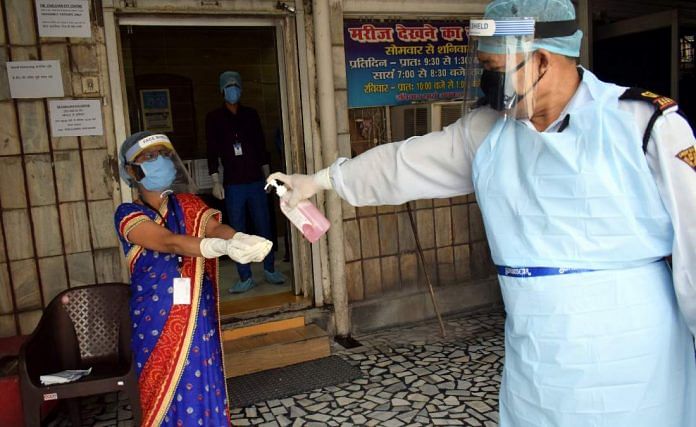New Delhi: The SARS-CoV-2 virus can survive on human skin for nine hours, which is much longer than flu viruses can, a new study from Japan revealed.
The study, published in the journal Clinical Infectious Diseases on 3 October, aimed to evaluate the “stability” of the virus that causes Covid-19 on human skin and compared it to a strain of the Influenza A virus (IAV). It is yet to be peer-reviewed.
Researchers from the Kyoto Prefectural University of Medicine, Japan, found that SARS-CoV-2 lingered on human skin grafts for nine hours while IAV survived on skin for only two hours.
“We evaluated the stability of SARS-CoV-2 and influenza A virus (IAV), mixed with culture medium or upper respiratory mucus, on human skin surfaces and the dermal disinfection effectiveness of 80% (w/w) ethanol against SARS-CoV-2 and IAV,” the researchers noted in the study.
Both these viruses, however, were inactivated within 15 seconds under an ethanol (alcohol) treatment. This emphasises the importance of washing hands and using alcohol-based sanitisers to contain the spread of Covid-19.
The study maintained that since SARS-CoV-2 survives on human skin for a long time, it may “increase the risk of contact transmission” and this could further “accelerate the pandemic”.
Also read: Moderna says it won’t enforce Covid vaccine patents during pandemic
Virus inactivated on human skin quicker than other surfaces
Researchers also found that both SARS-CoV-2 and IAV were ‘inactivated’ more quickly on human skin than other surfaces like stainless steel, glass, plastic etc.
In the early stages of the pandemic, research indicated that the virus survives longer on smooth surfaces like copper, glass and stainless steel. It could linger on copper surfaces for upto 4 hours, on cardboard for upto 24 hours and can survive on glass and plastic surfaces for approximately 72 hours.
However, according to a report in Live Science, similar research was not carried out on human skin for ethical reasons.
This is why the Japanese study did not conduct the experiment on people but on skin grafts from autopsies in laboratory conditions. These samples had been taken one day after death.
The study said, “We developed a model to accurately evaluate the stability of the viruses on human skin. This model was designed such that the skin sample did not deteriorate because of drying even after long-term incubation.”
Also read: 5 ways in which Vitamin D can help prevent multiple organ damage from Covid



